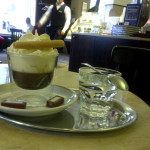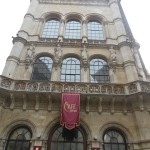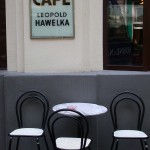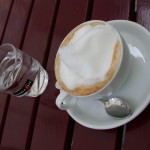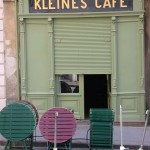Vienna and her Coffeehouses – Sit Back and Smell the Coffee
“The Viennese go to coffeehouses, because they do not want to stay at home but also don’t want to be outside, because they want to be alone, but in the company of others.”
– Jörg Mauthe
Vienna and her coffeehouses are inseparable and it’s one of the things I love most about this city.
At the turn of the century Vienna boasted over 600 coffeehouses. Today many of these traditional places still thrive and provide a living room away from home for Vienna’s business people, students, artists, intellectuals and international guests in the same way they did over one hundred years ago. Many Viennese then and now, have one particular coffeehouse they like to frequent, their so-called Stammcafé and sometimes even a particular table where they like to sit, their Stammtisch.
Not only do the waiters, dressed in a black coat and tails, even today, look the picture of etiquette and grace of a bygone age, they still act it too. If you want a quick coffee and to get on your way again, be sure to ask for the tab once the coffee is brought, otherwise you might wait a while because in a Vienna coffeehouse, no one expects you to drink and run.
In today’s world of multitasking, fast food, speedy service, instant delivery, finding a retreat in the middle of the city that not only allows you but expects you (!) to take a few hours to sit back and smell the coffee is balsam to the soul.
Some of my favorite coffeehouses:
Bräunerhof: especially on a Sunday afternoon when they often host musicians around 4 pm. I love it here because you walk in and feel like you have stepped back in time and could look over at the neighbor table and see Thomas Bernhard scribbling notes for his next novel in his beloved Stammcafé . You can sit in Bräunerhof for hours reading the papers, a book or writing and no one would ever dream of hurrying you along.
Café Central: for a lunch menu during the week (the food is wonderful) or for a late afternoon dessert. The Klimt Torte is particularly decadent. And I love bringing out-of-town guests here and watching their faces light up in tormented indecision as they study the savory contents of the dessert vitrine. Usually I end up suggesting desserts for the table so everyone can try a bit of everything. Café Central can get crowded especially at lunchtime so reservations are recommended. But once you are seated, you no longer notice the hustle and bustle. In fact, it adds to the experience.
Don’t overlook Peter Altenberg who keeps vigilant watch by the door. When my book finally gets out, English-speaking readers will learn more about the beloved poet who used Café Central as his home address.
If walls could speak!
Café Central has been host and Stammcafé to so many philosophers, writers, poets, politicians and artists over the years that it is almost impossible to list them all. A few: Adolf Loos, Sigmund Freud, Ludwig Wittgenstein, Vladimir Lenin, Leon Trotsky, Hugo von Hofmannsthal…And the list goes on and on.
Once when a coffeehouse waiter asked Peter Altenberg if he knew who died, Herr Altenberg responded, “Everyone is fine by me.”
Café Diglas: Years ago, I used to frequent Café Diglas rather often. Nowadays less so but it hasn’t lost any of its ambiance or charm and has a great location right across from the book store Morowa on Wollzeile. It is open 365 days a year, from 7 am till midnight. Now the place is famous for its funky toilet doors. They are transparent until you close them, then they cloud over. Don’t take my word for it, see the youtube video here: Cafe Diglas’ Magical Doors
Café Landtmann: Now a place for politicians and business people have meetings, they have a wonderful breakfast selection and you might be interested in knowing that this was once Sigmund Freud’s Stammcafé.
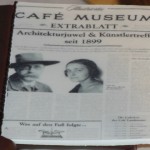
Peter Altenberg and Lina Loos adorn the frontpage of Cafe Museum’s Cake for the Ball of the Coffeehouseowners
Café Museum: Last time I stopped by for an in-between hour at Café Museum, when I asked the waiter for the bill, he started reciting the damage: “a bottle of champagne, a serving of caviar” and he stopped and I smiled. “Just a mélange” I replied. And he raised his eyebrows as if sharing a secret. “Ahh yes. Perhaps we’ll save another day for the rest then.” I love Café Museum and not just because it was once designed by one of the main characters of one of my books – Adolf Loos.
I love it because you come here and feel relaxed and welcome. As soon as you take your seat, you feel a integral part of the place rich with history and culture and you know you can sit for hours without a hurry or worry.
Hawelka: Right off of Graben is where all the actors and artists loved to hang out. Amazing Austrian authors like Friedrich Torberg, HC Artmann and Hans Weigel liked to come here. Famous for its legendary Buchteln (sweet pull apart rolls often filled with jam and served with vanilla sauce), they are still made fresh in-house. The tables are situated in such a way that you feel like you are being discreet when you come here.
I had the good fortune one day several years ago of spending a few hours with Leopold Hawelka, who opened the coffeehouse in 1939 with his wife, Josefine. I walked over to his Stammplatz, situated by the entrance where many an out-of-town visitor moseyed on by him unaware of who had just welcomed them in and I asked if he would mind if I asked him some questions about the Café Hawelka. I think I made his day. He clambered his 93-year old body down from his stool and fetched some books and photo albums and joined us at our table. As his wife, Josefine, buzzed around their guests, still directing the workings of the coffeehouse at age 91, Herr Hawelka proudly shared with us pages upon pages of newspaper clippings, photos and articles about their coffeehouse. And every few minutes, his stories would revert back to tales of his wife as he lovingly looked up at her who had no time to waste for such idle talk. Though both Josefine and Leopold have since passed away, their son has taken over the coffeehouse and still makes the Buchteln according to his mom’s famous recipe.
Kleines Café: What’s not to love about Franziskanerplatz? In summer, Kleines Café moves its table onto the square and though you are just steps from the busy Kärntnerstrasse you feel like you are in another world. “Kleines Café” means “Little Café” and the place is indeed small. Fans of the Ethan Hawk and Julie Delpy film “Before Sunrise” (which I definitely recommend) will be happy to know that this is the place Jesse and Celine were having a coffee when a gypsy woman came along and read Celine’s palm and then told them not to forget that they are both stars.
Coffeehouse quotes:
The Viennese go to coffeehouses, because they do not want to stay at home but also don’t want to be outside, because they want to be alone, but in the company of others.
– Jörg Mauthe
People go to the coffeehouse to rest, to read newspapers, to work, to speak about important things, to see friends, to finish correspondences, to be close to beloved beings and those who should become such, people go for these and countless other reasons and go above all quite mechanically, out of habit, as a constitutional condition, as a reflex, without a particular occasion (which according to Karl Kraus proves signs of “nomadic domesticity”), occasionally people even drink a coffee in a coffeehouse, but that’s not the reason one goes there.
– Hans Weigel
The coffeehouse is a home with all the advantages and none of the disadvantages. You can leave it anytime. That is why you like to go there and hate to leave it. You have social possibility, so many, that you do not need to engage in them all. Company is available, talk, and you are a poised gentleman over chance. If you get bored, you can pay and leave –try doing that once when you are a guest or host in a home.
– Hans Weigel
If you are Viennese and want to share the coffeehouse experience with a guest to the city, sign up to participate in the Vienna Coffeehouse Conversations from the end of September 2013 until the end of November 2013.

Check out this cool post on the Vienna coffeehouse from Nicholas Parsons, October 2012, “The Ballad of the Wiener Kaffeehaus” as an ode to Vienna’s cafe culture.
